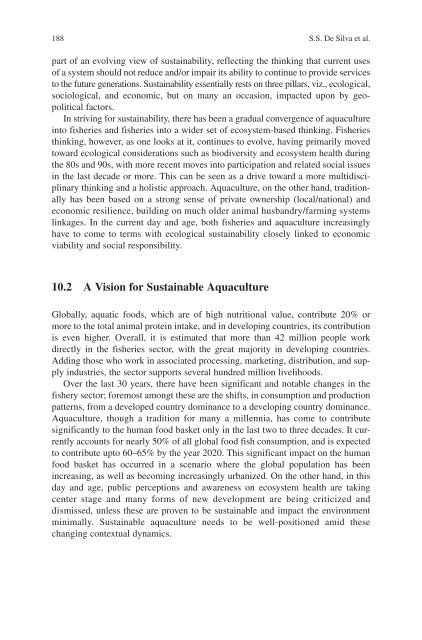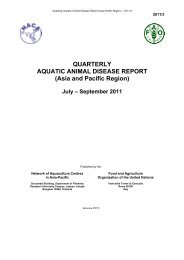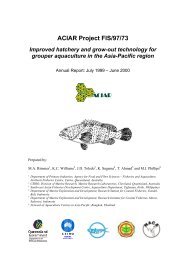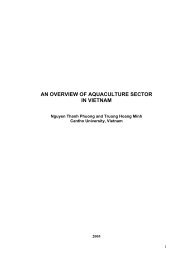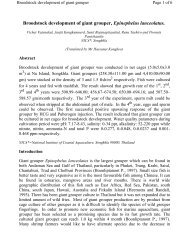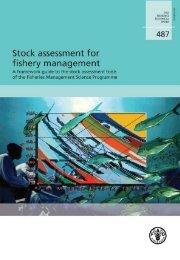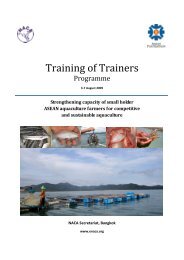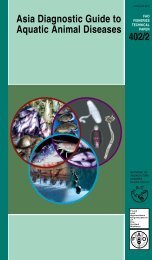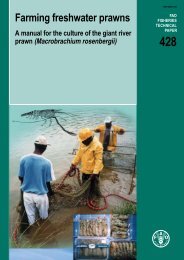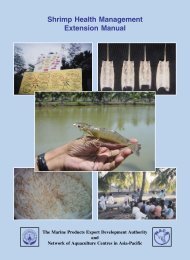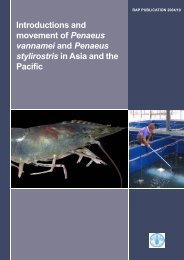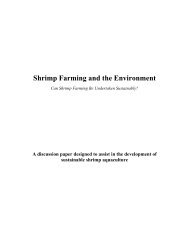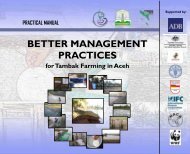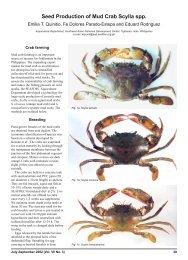Success Stories In Asian Aquaculture - Library - Network of ...
Success Stories In Asian Aquaculture - Library - Network of ...
Success Stories In Asian Aquaculture - Library - Network of ...
- No tags were found...
You also want an ePaper? Increase the reach of your titles
YUMPU automatically turns print PDFs into web optimized ePapers that Google loves.
188 S.S. De Silva et al.part <strong>of</strong> an evolving view <strong>of</strong> sustainability, reflecting the thinking that current uses<strong>of</strong> a system should not reduce and/or impair its ability to continue to provide servicesto the future generations. Sustainability essentially rests on three pillars, viz., ecological,sociological, and economic, but on many an occasion, impacted upon by geopoliticalfactors.<strong>In</strong> striving for sustainability, there has been a gradual convergence <strong>of</strong> aquacultureinto fisheries and fisheries into a wider set <strong>of</strong> ecosystem-based thinking. Fisheriesthinking, however, as one looks at it, continues to evolve, having primarily movedtoward ecological considerations such as biodiversity and ecosystem health duringthe 80s and 90s, with more recent moves into participation and related social issuesin the last decade or more. This can be seen as a drive toward a more multidisciplinarythinking and a holistic approach. <strong>Aquaculture</strong>, on the other hand, traditionallyhas been based on a strong sense <strong>of</strong> private ownership (local/national) andeconomic resilience, building on much older animal husbandry/farming systemslinkages. <strong>In</strong> the current day and age, both fisheries and aquaculture increasinglyhave to come to terms with ecological sustainability closely linked to economicviability and social responsibility.10.2 A Vision for Sustainable <strong>Aquaculture</strong>Globally, aquatic foods, which are <strong>of</strong> high nutritional value, contribute 20% ormore to the total animal protein intake, and in developing countries, its contributionis even higher. Overall, it is estimated that more than 42 million people workdirectly in the fisheries sector, with the great majority in developing countries.Adding those who work in associated processing, marketing, distribution, and supplyindustries, the sector supports several hundred million livelihoods.Over the last 30 years, there have been significant and notable changes in thefishery sector; foremost amongt these are the shifts, in consumption and productionpatterns, from a developed country dominance to a developing country dominance.<strong>Aquaculture</strong>, though a tradition for many a millennia, has come to contributesignificantly to the human food basket only in the last two to three decades. It currentlyaccounts for nearly 50% <strong>of</strong> all global food fish consumption, and is expectedto contribute upto 60–65% by the year 2020. This significant impact on the humanfood basket has occurred in a scenario where the global population has beenincreasing, as well as becoming increasingly urbanized. On the other hand, in thisday and age, public perceptions and awareness on ecosystem health are takingcenter stage and many forms <strong>of</strong> new development are being criticized anddismissed, unless these are proven to be sustainable and impact the environmentminimally. Sustainable aquaculture needs to be well-positioned amid thesechanging contextual dynamics.


